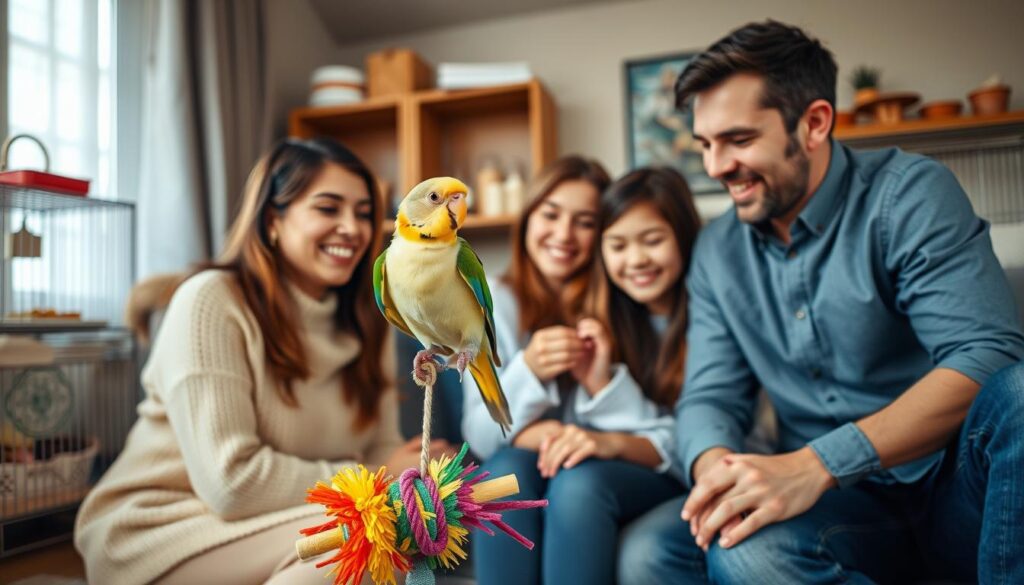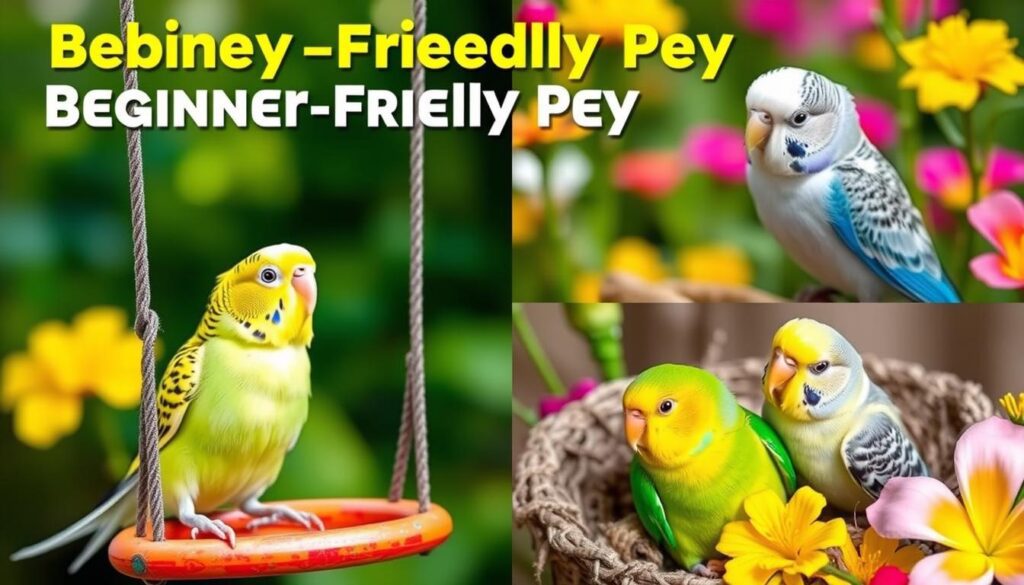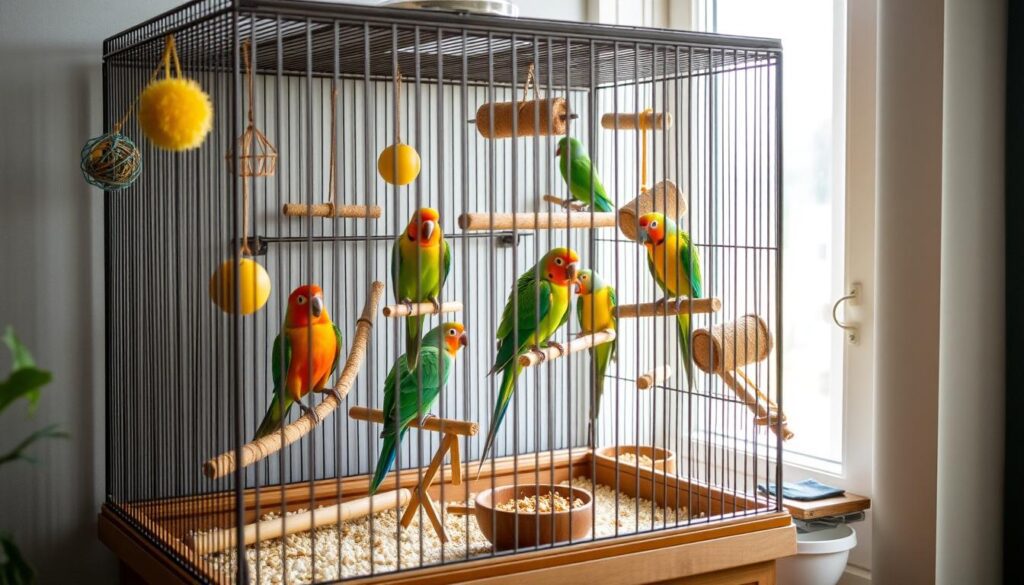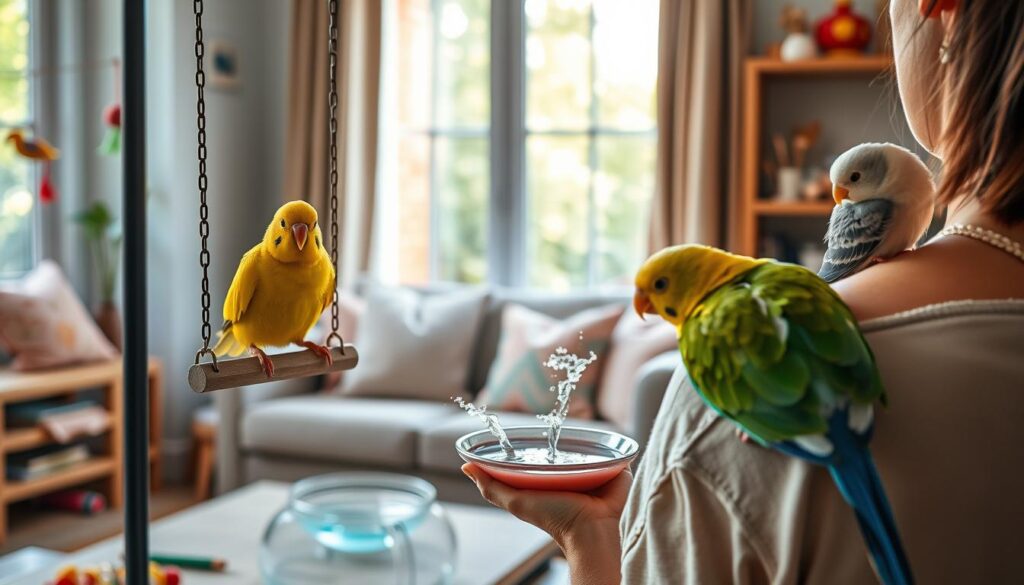Picture this: a cozy room filled with the cheerful chirping of happy birds. A bright, lively budgie flutters from one perch to another, while a charming cockatiel sings sweet tunes, bringing joy to the household. This scene is just a glimpse of the happiness that welcoming a pet bird into your life can bring.
The appeal of pet birds goes beyond their vibrant colors and playful antics. Their unique personalities and the companionship they offer make them wonderful additions to any home.
If you’re considering adding a new feathered friend to your family, you’re in luck! This guide highlights the best pet birds for beginners, showcasing the ideal choices for novices ready to embark on the delightful journey of bird ownership.
Understanding their care requirements and personality traits is essential to finding the right match for your lifestyle. With the right knowledge, you can ensure a harmonious relationship with your new avian companion.
Key Takeaways
- Choosing the right species is crucial for first-time bird owners.
- Consider the lifespan and commitment level of different bird species.
- Birds like budgies and cockatiels are among the best pet birds for beginners.
- Understand the unique care needs and personality traits of each species.
- Pet birds can bring joy and companionship into your home.
Why Choose a Pet Bird?
Choosing a pet bird can be a delightful decision, filled with numerous advantages to enhance everyday life. The benefits of bird ownership include their vibrant personalities, intelligence, and social nature. Friendly pet birds can brighten up a household with their colorful feathers and unique sounds, bringing joy to the family dynamic.
Benefits of Bird Ownership
Pet birds offer a fascinating glimpse into the animal kingdom, showcasing traits that set them apart from traditional pets. Their ability to mimic sounds not only entertains but also fosters a deeper connection with their owners. With over 300 species of parrots available, potential owners can discover vibrant personalities that match their lifestyle. Birds such as canaries are celebrated for their vocal talents and vivacious Twittering, while finches bring an energetic atmosphere that livens up any space. The companionship of these feathered friends significantly contributes to emotional well-being, as they provide affection that many owners cherish.
Companionship and Personality
Beyond their charming appearances, birds can form genuine bonds with their owners. The companionship that pet birds offer creates not just a pet-owner relationship, but also a meaningful friendship. Cockatiels, for instance, are known for their loving and cuddly nature, making them favorite companions in many homes. Understanding bird behavior is crucial for developing a strong relationship, allowing owners to appreciate the unique personalities that each bird displays. Engaging with friendly pet birds helps foster a sense of connection that can greatly enrich one’s life.

Ideal Bird Species for First-Time Owners
Choosing the right feathered friend is crucial for newcomers to bird ownership. Certain species stand out as top pet birds for newcomers due to their friendly nature and manageable care requirements. Here are some of the most popular pet birds for beginners that can make excellent companions.
Budgerigar (Budgie)
Budgerigars, commonly known as budgies, are among the most sought-after beginner pet birds. They are small, weighing around 1 ounce and measuring between 6 to 8 inches in length. Budgies can live between 7 to 15 years when properly cared for. Their playful demeanor and sociable personality make them a joy to have in any home.
Cockatiel
Cockatiels are another excellent choice for novice bird owners. With an average weight of approximately 3 ounces and a length of 12 to 13 inches, they are larger compared to budgies. Properly cared for, cockatiels can achieve a lifespan of 15 to 20 years, with some living up to 30 years. Their affectionate nature and amusing antics provide endless entertainment and companionship.
Lovebird
Lovebirds, weighing around 2 ounces and measuring 5 to 6 inches long, are known for their playful and affectionate behavior. While they may require a bit more effort in bonding and socialization, their vibrant personalities make them one of the most delightful popular pet birds for beginners. With love and attention, lovebirds can live for over 20 years.

Understanding Bird Care Basics
Beginning bird care requires knowledge of essential supplies and dietary needs to ensure your feathered friend thrives. Understanding these bird care basics stands as a priority for new pet owners. Fostering a nurturing environment goes beyond providing a cage. It involves attention to the specific needs of low-maintenance pet birds and their daily requirements.
Essential Supplies
A suitable cage is vital for any pet bird. It should offer enough space to move freely while containing safe materials. Along with the cage, having adequate food and water dishes is crucial. Consider adding various toys and perches, as they not only promote engagement but also cater to their natural behaviors. Beginner bird care tips suggest monitoring the cleanliness of the cage to prevent the growth of parasites and maintain a hygienic habitat for your bird.
Diet and Nutrition
Maintaining a well-rounded diet is crucial for your pet’s health. Different species have unique dietary requirements; for example, some thrive on seeds and pellets, while others benefit from fresh fruits and vegetables. Understanding these nutritional needs forms the backbone of bird care basics, promoting better overall health. Observing any shifts in your bird’s appetite can help identify potential health concerns early on, which is an essential aspect of effective bird care.

Creating a Safe and Happy Environment for Your Bird
Ensuring your feathered friend thrives begins with creating a bird-friendly space that promotes safety and joy. The right cage setup is paramount. A spacious cage allows your bird to fully extend and flap its wings, crucial for physical health. Consider positioning the cage away from direct sunlight and drafts to maintain a safe environment for birds. Including at least three perches of varying diameters and materials enhances their ability to move comfortably. Additionally, proper placement of food and water bowls supports a clean and accessible area for your bird.
Cage Setup and Location
Your bird’s habitat requires careful attention. The cage should feature at least three different toys to prevent boredom, with additional toys rotated regularly for variety. Daily maintenance is essential; regularly change the cage liner, wash bowls, and replace worn toys. Considering the placement of the cage is vital not only for aesthetics but for the bird’s well-being as well. Interaction with humans and natural light can enhance your bird’s happiness.
Enrichment Activities
Engaging your bird with enrichment activities for birds fosters excitement and mental sharpness. Interactive playtime, cognitive tasks, and sensory exploration all contribute to their overall quality of life. Birds thrive on social interaction, whether with humans or other avian friends. Without proper stimulation, birds can develop undesirable behaviors like feather-plucking. Incorporate environmental enrichment tools such as play gyms and T-perches to encourage activity. Ensuring a variety of engaging toys can keep your bird entertained while preventing stereotypic behaviors.
Incorporating the S.P.I.D.E.R. Framework ensures all aspects of your bird’s needs are met. This includes providing social, psychological, intellectual, dietary, environmental, and recreational enrichment tailored to their species and size. By promoting a stimulating environment, you help your bird remain engaged, lively, and ultimately, happy in its surroundings. Understanding the essentials of caring for a pet bird will positively impact both your bird’s happiness and your experience. For further insights on parenting techniques that relate to enriching environments, check out this comprehensive guide on navigating parenthood.
Training Your Pet Bird
Training pet birds is a vital step in establishing a solid relationship between you and your feathered friend. Understanding the various aspects of socialization tips for birds can enhance your bird’s confidence and behavior, making for a happier pet. With consistent practice, you can teach your bird basic commands, which not only reinforces trust but also sets the stage for successful bonding with your bird.
Basic Commands and Socialization
Many birds, such as cockatiels, budgerigars, and lovebirds, are particularly eager to learn basic commands. One of the first commands to teach is “step up,” which encourages your bird to perch on your hand. This behavior is essential for building a trustworthy connection. For birds like African grey parrots, while they may be capable of complex tasks, they might not be as responsive during training as more social species. Younger birds and those accustomed to handling tend to learn faster than older or more timid individuals. Remember, a distraction-free environment makes training smoother and more effective.
Bonding with Your Bird
The process of bonding with your bird requires patience, love, and understanding. Training pet birds should be a stress-free experience, with the emphasis on positive reinforcement. Utilizing treats can significantly enhance your training sessions, creating an enjoyable atmosphere for both you and your bird. Regular interactions contribute to trust, ensuring your pet feels safe and cherished. For more information on incorporating healthy practices into your routine, you can explore anti-inflammatory dietary options that may also benefit overall wellbeing.
Common Misconceptions About Pet Birds
When considering pet birds, potential owners often encounter numerous common bird myths that can lead to misunderstandings. These misconceptions can affect the way people perceive bird ownership and their ability to care for these beautiful creatures. Dispelling these myths is crucial for ensuring that both birds and their owners have a fulfilling experience.
Birds and Noise Levels
One of the most significant misconceptions relates to the noise levels of pet birds. Many individuals think that all birds are quiet, which simply is not the case. Different species exhibit a wide range of vocalization tendencies. Social breeds, especially parrots, often communicate with loud calls, which can be mistaken for excessive noise. Understanding the natural behaviors of these birds can help potential owners prepare for the reality of their new pet’s vocal habits.
Lifespan Myths
Another common misunderstanding concerns bird lifespan. Many believe that small birds have short lives, but this could not be further from the truth. With proper care and a nurturing environment, many small birds can thrive for years and even decades. In fact, some species can live well into their eighties or longer. Investing time and effort in their well-being can significantly impact their longevity, as domestic birds often enjoy longer lives than their wild counterparts. By educating oneself about these common bird myths, prospective owners can make informed decisions and build lasting relationships with their feathered friends. For more tips on managing challenges, consider this resource.
Where to Find Your New Feathered Friend
When it comes to finding pet birds, choosing the right source is crucial for ensuring a healthy and happy addition to your home. Prospective bird owners often find themselves weighing the benefits of acquiring a bird from reputable breeders versus pet stores. Reputable breeders tend to prioritize the health and socialization of their birds, providing a wealth of knowledge about their care and behavior. Additionally, purchasing from a breeder often means that you receive a bird that has been properly socialized from a young age, setting the stage for a stronger bond.
Reputable Breeders vs. Pet Stores
On the other hand, pet stores may offer a variety of bird species with varying levels of care and socialization. The key is to do your research to identify stores that maintain high ethical standards and prioritize animal welfare. By visiting local aviaries or bird clubs, you can often discover a network of reputable breeders dedicated to the well-being of their feathered friends.
Adoption Options and Resources
For those seeking a more compassionate route, consider exploring pet bird adoption resources. Bird rescues or shelters focused on avian care provide an opportunity to give a bird a second chance at a loving home. Many dedicated organizations help rehome birds in need, offering a range of species from budgies and conures to more exotic types. Engaging with these resources not only benefits the birds but can also lead to rewarding relationships. Remember, whether you choose to adopt or acquire from a breeder, you’re making a significant commitment to your new companion, often promising many years of companionship.











